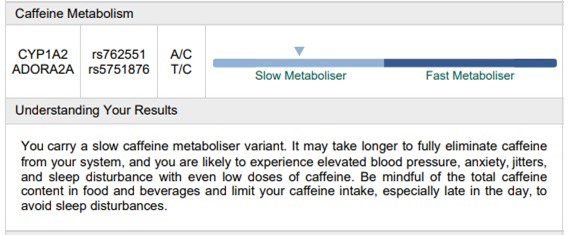19/06/2024
As an athlete, you’re always looking for new ways to give yourself a leg up on the competition. Even if you aren’t particularly athletic, we all seek ways to improve aspects of our performance – from a morning jolt before work to brain juice for late night study sessions. A recent genomic analysis of Coffea arabica, a coffee plant species which accounts for 60% of coffee products around the world, has shown it to have originated between 610,000 and 1 million years ago1, making it much older than the human species. It’s also becoming increasingly clear that your genetics impact your caffeine metabolism and how sensitive you are to its effects.
This article explores what caffeine sensitivity entails, the genes making the impact and how a small blood sample can provide you insight on this among many of your unique nutrition & lifestyle preferences through DNA testing.
Caffeine Metabolism – The First Cup Of Coffee.
The first use of coffee was in 13th century Arabia. The Muslim community drank coffee for its stimulant properties, incorporating it into their long prayer sessions. By the 17th century, the coffee trade had reached Europe when a pilgrim left Mecca with fertile coffee beans, exposing Europeans to a new potion. In America, coffee first gained traction due to the Boston Tea Party of 1773 – Americans felt it was their patriotic duty to switch from tea to coffee. The US Civil war saw a continued rise in consumption of Joe as soldiers quickly began to rely on the energy boost many of us lean on every day. When the first Starbucks opened in Seattle in 1971, the idea of speciality coffee quickly took hold, changing the world forever.
Nowadays, caffeine is the most widely used psychoactive stimulant in the world. It’s estimated we drink around 2.25 billion cups of coffee every day. Some take it hot. Some take it cold. With milk or without. It’s tough to find someone who never drinks coffee. Even those who despise the black gold tend to consume caffeine in some way. Energy drinks are full of the stuff. As are many other carbonated drinks. Cocoa beans naturally contain caffeine, so chocolate products, particularly dark chocolate, can contribute to caffeine intake. Tea, both black and green, also contain caffeine, although typically in lower amounts than coffee.
Caffeine works mainly by blocking adenosine receptors in the brain. Because it can dissolve in both fat and water, it easily enters the brain. By blocking these receptors, caffeine keeps you alert and awake2. However, caffeine doesn’t affect us all the same; people metabolise caffeine at different rates, and some are more sensitive to its affects than others. Research has identified 2 genes which are responsible for these differences: CYP1A2 and ADORA2A.
CYP1A2
Caffeine metabolism occurs primarily in the liver by an enzyme known as cytochrome P450 1A2 (CYP1A2) which is encoded in the gene CYP1A2.
A. 65% B. 85% C.95%
A.65% B.85% C.95%
C. 95%!
Tap/Hover Mouse Here To Reveal Answer.
The genotypes known as the slow variants (AC & CC) are linked to reduced levels of the CYP1A2 enzyme3,4. Individuals with these variants have a slower rate of caffeine metabolism , resulting in prolonged caffeine presence in the bloodstream. The extended duration of caffeine circulation increases the likelihood of heart issues and high blood pressure. The same study showed that those who are fast metabolisers (AA) have reduced risk of a heart attack if they consume at least one cup of coffee per day compared to not drinking any coffee3.
One study looked specifically at the effects of caffeine on performance between individuals with different genetic variants. The authors found that low caffeine doses improve performance in fast metabolisers and had no or negative effects in slow metabolisers4. Similar effects have been reported in basketball players9 and in resistance training10. These effects seem to be most prominent in long duration exercise – long distance cyclists who harbour the fast metabolism variant showed improved time trial results4.
When it comes to athletic performance, the results from studies tend to be inconsistent. Some show that caffeine enhances performance5, while others say there is no or negative effects6,7. However, many of these studies don’t account for differences in individuals’ caffeine metabolism. A meta-analysis that considered individual genetic variation concluded that caffeine improved performance for some, and reduce performance for others, depending on the genotype they harbour8.
ADORA2A
Caffeine, along with its byproduct’s theophylline and paraxanthine, block adenosine receptors in the body. This blocking action, especially on the A2a receptor (ADORA2A), is what causes the effects we feel from caffeine2. Adenosine is a substance produced during the breakdown of ATP (a molecule that stores and transfers energy within cells), which normally slows down parts of our nervous system. By blocking adenosine binding, caffeine increases the release of norepinephrine and epinephrine, which helps with glucose release and mobilisation11. Our sensitivity to caffeine is influenced by the ADORA2A gene.
Genetic variants in the ADORA2A gene have been associated with differences in caffeine metabolism or sensitivity. It has been shown that variations in this gene can alter an individual’s sensitivity to the wakefulness effects of caffeine and the sensitivity to caffeine-induced anxiety12. These differences have been shown to be more prominent in women, whose caffeine tolerance is naturally lower when compared with men13.
Lifestyle and Nutrition DNA
At Randox Health, we’re here to provide you with the information you need to improve your wellbeing and performance. Included in our Nutrition and Lifestyle DNA package, we analyse your CYP1A2 and ADORA2A genes to look for variants which indicate if you’re caffeine metabolism is fast or slow .
You can use the results from you Nutrition and Lifestyle DNA test to tailor your training plan, including your caffeine intake, to ensure you are performing at your absolute best. If you aren’t interested in competing in the Olympics, the results can still help you make the right lifestyle decisions to optimise your wellbeing.
We are incredibly proud of the reports we create to deliver your test results. Although we’ve focused on caffeine metabolism, your personalised report displays detailed DNA analysis highlighting factors that could impact your nutrition and overall health via 20+ different parameters.. Armed with this information, you can tailor your diet and exercise regimen to align with your genetic makeup, maximizing the benefits of your lifestyle choices.
In your personalised DNA analysis, you’ll get the name of the gene analysed, the variant name or unique ‘rs’ number associated with the variant you have, and the 2 letter base pair of your genotype (e.g. A/A).
To make understanding your report even easier, we incorporate a result scale that visually demonstrates how your genetic information compares to other variations in terms of risk.
Additionally, we provide a comprehensive explanation of your results, detailing what they signify, their implications for your health, and what they mean for you.

What Happens at my appointment?
At your appointment, we’ll collect a straightforward blood sample and guide you through the process. Your results and comprehensive report will be available 4-6 weeks later. Armed with this information, you can identify habits to change and decide on lifestyle adjustments to support your journey toward becoming the best version of yourself.

References
- Salojärvi J, Rambani A, Yu Z, et al. The genome and population genomics of allopolyploid Coffea arabica reveal the diversification history of modern coffee cultivars. Nat Genet. 2024;56(4):721-731. doi:10.1038/s41588-024-01695-w
- Evans J, Richards JR, Battisti AS. Caffeine. StatPearls Publishing; 2024. Accessed April 17, 2024. https://ncbi.nlm.nih.gov/books/NBK519490/
- Cornelis MC, El-Sohemy A, Kabagambe EK, Campos H. Coffee, CYP1A2 Genotype, and Risk of Myocardial Infarction. JAMA. 2006;295(10):1135. doi:10.1001/jama.295.10.1135
- GUEST N, COREY P, VESCOVI J, EL-SOHEMY A. Caffeine, CYP1A2 Genotype, and Endurance Performance in Athletes. Med Sci Sports Exerc. 2018;50(8):1570-1578. doi:10.1249/MSS.0000000000001596
- Doherty M, Smith PM. Effects of caffeine ingestion on rating of perceived exertion during and after exercise: a meta‐analysis. Scand J Med Sci Sports. 2005;15(2):69-78. doi:10.1111/j.1600-0838.2005.00445.x
- SKINNER TL, JENKINS DG, COOMBES JS, TAAFFE DR, LEVERITT MD. Dose Response of Caffeine on 2000-m Rowing Performance. Med Sci Sports Exerc. 2010;42(3):571-576. doi:10.1249/MSS.0b013e3181b6668b
- Hunter AM, St A, Gibson C, Collins M, Lambert M, Noakes TD. Caffeine Ingestion Does Not Alter Performance during a 100-km Cycling Time-Trial Performance. Int J Sport Nutr Exerc Metab. 2002;12(4):438-452. doi:10.1123/ijsnem.12.4.438
- BARRETO G, ESTEVES GP, MARTICORENA F, OLIVEIRA TN, GRGIC J, SAUNDERS B. Caffeine, CYP1A2 Genotype, and Exercise Performance: A Systematic Review and Meta-analysis. Med Sci Sports Exerc. 2024;56(2):328-339. doi:10.1249/MSS.0000000000003313
- Puente C, Abián-Vicén J, Del Coso J, Lara B, Salinero JJ. The CYP1A2 -163C>A polymorphism does not alter the effects of caffeine on basketball performance. PLoS One. 2018;13(4):e0195943. doi:10.1371/journal.pone.0195943
- Rahimi R. The effect of CYP1A2 genotype on the ergogenic properties of caffeine during resistance exercise: a randomized, double-blind, placebo-controlled, crossover study. Irish Journal of Medical Science (1971 -). 2019;188(1):337-345. doi:10.1007/s11845-018-1780-7
- Banks NF, Tomko PM, Colquhoun RJ, Muddle TWD, Emerson SR, Jenkins NDM. Genetic Polymorphisms in ADORA2A and CYP1A2 Influence Caffeine’s Effect on Postprandial Glycaemia. Sci Rep. 2019;9(1):10532. doi:10.1038/s41598-019-46931-0
- Erblang M, Drogou C, Gomez-Merino D, et al. The Impact of Genetic Variations in ADORA2A in the Association between Caffeine Consumption and Sleep. Genes (Basel). 2019;10(12):1021. doi:10.3390/genes10121021
- Temple JL, Ziegler AM. Gender Differences in Subjective and Physiological Responses to Caffeine and the Role of Steroid Hormones. J Caffeine Res. 2011;1(1):41-48. doi:10.1089/jcr.2011.0005



